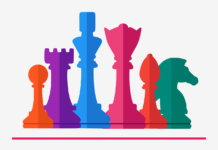Information overload refers to the incredible amount of information that’s constantly popping up on our screens. These commonly include texts, emails, tweets, the endless stream of articles on the Internet, Facebook posts, viral videos, photos and gifs, memes, and so much more.
According to Daniel Levitin in his book “The Organized Mind: Thinking Straight in the Age of Information Overload”, the human race has created more information in the last ten years than in all of human history.
The ever-connected world in which we live in is constantly bombarding our senses with every kind of stimuli, significantly beyond what our brains can handle. In fact, an average person can at most be aware of up to 4 things at once. If we go beyond that, our focus starts to lag, our judgment gets compromised, and we lose track of things.
That’s where these 7 tips and tricks below can come in quite handy!
1. Clear Your Mind With a Brain Dump

One of the best things you can do to fight information overload is to dump things out of your brain. Clearing your mind is key, and a brain dump can help you do that. This activity simply consists of creating a list of everything you have going on in your mind.
Write down all the things that interrupt your flow. This will allow you to keep these thoughts out of your head, which will allow you to focus on the things that truly matter. Once you’ve gotten everything down on paper, organize these thoughts into categories, such as: things to do today, things to do this week, things to delegate, and things to drop.
2. Practice the Two-Minute Rule

If you find that you have a bunch of small tasks to go through in a day, take up to an hour during the day to organize these tasks and take care of the ones that require two minutes or less of your time. These can include checking your email, making phone calls, tidying up, and others.
By going through the things that take you only a little time, you’ll be more efficient the rest of the day. If you don’t, you’ll find yourself trying to multitask every time you remember one of those small tasks, and that will only split your focus. And not in an effective way!
3. Stack Up Your Tasks

If you have tasks to go through that are similar to each other, the best thing you can do is stack them up and do them all together. For example, if you have a bill to pay, pay all your bills at once. If you have a shirt to wash, why not wash your entire basket of laundry?
The trick here is to complete one stack of tasks at a time. This will allow you to focus your attention on one thing at once but you’ll still get a lot done. What’s more, you’ll use your energy effectively and you’ll have more leftover by the end of the day.
4. Avoid Multitasking As Much As Possible

Even though you may think that multitasking can save you time in the long run, it doesn’t. Multitasking actually costs your brain a lot more oxygenated glucose, which is the fuel you need to focus. If you’re constantly switching between one task and the other, you will tire yourself a lot faster and become disoriented and anxious as well.
By engaging in one task at a time, you will use less energy and you’ll be able to focus a lot more, which will allow you to get things done faster and better. Avoid multitasking and you’ll find you’re a lot more effective, assertive and disciplined.
5. Schedule Your Email Time

Answering emails may seem like nothing, and even though it is indeed a simple task, it can still split your focus if you have other things going on. In fact, having an unread email and being aware of it while you’re trying to do something else can take 10 points off your effective IQ.
The issue is that emails come in every few minutes, so if you don’t want to have your cognitive skills impaired, what you need to do is schedule your email time. Set up two or three moments a day to just sit down and focus on your inbox. Turn the notifications off the rest of the time. You’ll find this is a lot better than checking your inbox 200 different times a day.
6. Take Breaks

People don’t usually think so, but taking breaks actually makes you more efficient. If you schedule 15-minute breaks every couple of hours, you’re giving your brain the chance to take a breather and reset. During this break, you can do whatever you like; listen to music, take a nap, read a book, take a walk.
This may seem like a waste of time at first if you’re not used to taking breaks, but it will actually boost your productivity and creativity throughout the day. Avoiding burnout is important, so take this time to be away from social media and screens; just do something you enjoy.
7. Allow Yourself to Daydream

Our brains operate in two different modes, one when you direct your thoughts and the other when you allow thoughts to take over. The first mode is the one that allows you to get things done. However, it’s not good for our minds to stay in one mode for the entire day.
That’s why it’s important to exercise the second mode, which is daydreaming. Daydreaming allows your brain to reset and to replenish the glucose you use up during the first mode. Daydreaming also improves creativity because by allowing your thoughts to flow freely, you’re able to find links that you couldn’t have seen before and come up with more creative solutions.
An Organized Mind is a Clear Mind

If you ever find yourself overwhelmed with information, applying one or more of the above strategies can potentially relieve your feeling of stress and being depressed.
Here are some more tips that you can use when you find yourself suffering from information overload!




